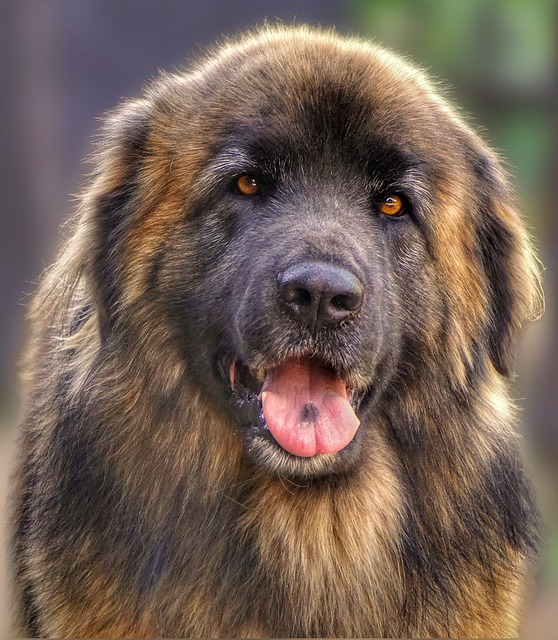


The Leonberger is a large, majestic dog breed known for its impressive size, friendly nature, and beautiful, thick coat. Often referred to as a "gentle giant," the Leonberger is a calm, loyal, and affectionate dog that thrives in a family environment. Its origins as a working dog give it a strong, hardworking character, while its temperament makes it an excellent companion. The Leonberger is not only known for its size but also for its versatility, excelling in roles such as therapy, search and rescue, and as a family pet.
The Leonberger originated in Germany in the 19th century. It was bred by a man named Heinrich Essig, who wanted to create a dog that resembled a lion. To achieve this, he crossed several breeds, including the Saint Bernard, Newfoundland, and the Great Pyrenees. The Leonberger was originally used as a working dog for pulling carts, guarding livestock, and performing water rescues. Over time, the breed became popular among European royalty and was even used as a show dog. The breed suffered a decline in the 20th century but was revived through dedicated breeding efforts, and today it is a beloved companion breed around the world.
The Leonberger is a giant breed with an imposing and muscular build. Males typically weigh between 110 and 170 pounds (50 to 77 kg), while females usually weigh between 90 and 140 pounds (41 to 64 kg). They stand between 25.5 and 31.5 inches (65 to 80 cm) at the shoulder. The Leonberger has a thick, water-resistant double coat that helps protect it from harsh weather conditions. The coat comes in various colors, including lion-yellow, red, and sand, with darker masks around the eyes and face. The breed’s head is large and strong, with a broad, flat skull, and it has expressive, almond-shaped eyes that give it a dignified and intelligent expression. Its tail is long, feathered, and carried low, completing the breed’s majestic look.
The Leonberger is known for its gentle, friendly, and social temperament. Despite its large size, it is typically calm and good-natured. The breed is loyal, affectionate, and protective of its family, making it an excellent companion for families with children and other pets. The Leonberger is known to be patient and tolerant, which makes it great with kids. While it can be reserved with strangers, it is generally friendly and will protect its loved ones if it senses danger. The Leonberger is also very intelligent and eager to please, making it relatively easy to train, though it may be a bit independent at times.
As a large and active breed, the Leonberger requires regular exercise to stay healthy and happy. It enjoys long walks, runs, and outdoor play, and it thrives in environments where it can get plenty of physical activity. The Leonberger is also an excellent swimmer and enjoys water-based activities. Daily exercise, such as brisk walks and some playtime, is essential to keep the breed in good shape. While the Leonberger enjoys outdoor activities, it is also content to relax indoors with its family after exercise. It is important not to over-exercise a young Leonberger, as their joints and bones are still developing during their first few years of life.
The Leonberger is an intelligent breed that is generally eager to please, making it relatively easy to train. However, it can sometimes display an independent streak, so consistent, positive reinforcement training methods are important. Early socialization is essential to help the Leonberger develop into a well-mannered and balanced dog. Exposure to different people, environments, and other pets will help the Leonberger become comfortable in various situations. While the breed is naturally gentle and good with children, socialization helps ensure that it interacts well with strangers and other animals. Obedience training should be started early to establish a solid foundation, as the breed’s large size can make it difficult to manage if not properly trained.
The Leonberger is generally a healthy breed, but like all large dogs, it can be prone to certain health conditions. Some common issues include hip dysplasia, elbow dysplasia, and heart problems. Regular veterinary check-ups are essential to monitor for these conditions and to ensure the dog stays healthy. The breed’s thick coat requires regular grooming to prevent matting and tangling. Brushing once or twice a week is usually sufficient, though during shedding seasons, more frequent grooming may be necessary. The Leonberger’s ears should be checked regularly for signs of infection, and its teeth should be brushed regularly to maintain good oral health. Due to its large size, the Leonberger is prone to bloat (gastric torsion), so it’s important to feed it smaller meals and avoid vigorous exercise immediately after eating.
The Leonberger has an average lifespan of 8 to 9 years. While this is relatively short for a dog, the breed is generally healthy and active during its life. Regular care, proper nutrition, and exercise can help extend the Leonberger’s life and ensure it remains fit and happy in its later years. As with all large breeds, it’s important to monitor for signs of joint issues and heart problems, which may become more prevalent as the dog ages.
© copyright Dog Compendium 2024 - 2026